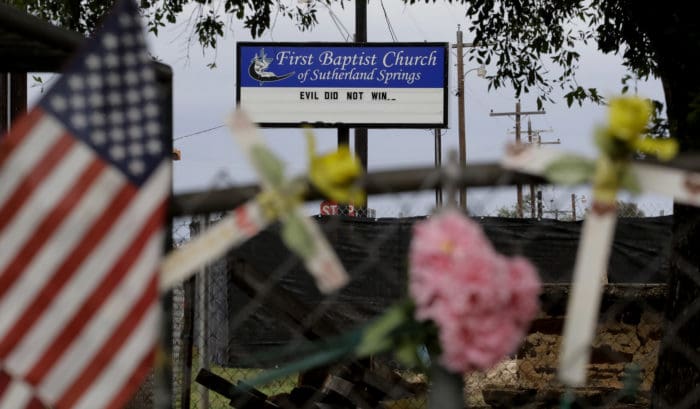Here we go again. Another lawsuit against a retailer who sold a legal product that was later used in the commission of a crime. As you may know, firearms manufacturers and retailers are shielded from these suits by the PLCAA, the Protection of Lawful Commerce in Arms Act. Now, two survivors of the Sutherland Springs church shooting have sued Academy Sports + Outdoor for selling the shooter 30-round magazines.
On Friday, Rosanne Solis and Joaquin Ramirez sued Academy Sports + Outdoors for selling Devin Patrick Kelley a Ruger AR-556 with 30 round capacity magazines. While this model is legal in Texas, Kelley was a resident of Colorado, where it’s illegal to sell, possess or manufacture magazines with capacities over 15 rounds.
“A Texas gun dealer [Academy] cannot sell a firearm and deliver that firearm to a citizen of another State if that sale would not be legal in the purchaser’s State of residence,” the lawsuit reads. “The Ruger should have never been placed in Kelley’s hands.”
We’re not attorneys and have no interest in impersonating one, but the argument here seems strained at best. Colorado has no “assault weapons” ban. They do, however, have a magazine capacity limit law. The sale of standard-capacity 30-round magazines was outlawed in 2013 following the Aurora theater shooting.
The Ruger AR-556 the shooter bought in Texas wasn’t illegal in Colorado. Claiming that because the rifle Kelley bought in Texas came with a 30-round magazine made it an illegal sale because he couldn’t own a 30-round magazine in Colorado is certainly a novel argument. If it’s successful, it would prompt retailers to ask for ID from everyone who purchases “high capacity” magazines and to know the laws of every state and city in the country.
Perhaps Solis and Ramirez should be directing their complaint against the federal government.
Kelley, who killed himself as he was fleeing police, was an Air Force veteran who was convicted of domestic abuse and discharged for bad conduct years before the shooting. The Air Force should have reported his criminal history to the FBI’s background check system, which would have kept him from purchasing a firearm. Multiple other Sutherland Springs families are suing the federal government for failing to do so, and one other family, who lost three members, filed a lawsuit last year against Academy Sports + Outdoors alleging similar violations.
The Dallas News dug up an “expert” who thinks the plaintiffs have an argument…although she admits that it’s extremely unusual.
Emily Taylor, a gun law expert in San Antonio, said she believes Solis and Ramirez have a case. Federal law prohibits licensed gun dealers from selling to residents of other states unless the buyer meets them in person and the sale “fully” complies “with the legal conditions of sale in both such States.”
“I think Academy screwed up,” Taylor said, adding this case is also extremely rare. “In fact, in practice I have never seen anything like this come up.”
Watch this space.
